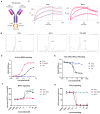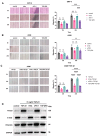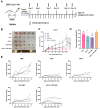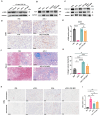A Bifunctional Anti-PD-1/TGF-β Fusion Antibody Restores Antitumour Immunity and Remodels the Tumour Microenvironment
- PMID: 40806691
- PMCID: PMC12347602
- DOI: 10.3390/ijms26157567
A Bifunctional Anti-PD-1/TGF-β Fusion Antibody Restores Antitumour Immunity and Remodels the Tumour Microenvironment
Abstract
Although PD-1/PD-L1 inhibitors have transformed cancer immunotherapy, a substantial proportion of patients derive no clinical benefit due to resistance driven by the tumour microenvironment (TME). Transforming growth factor-β (TGF-β) is a key immunosuppressive cytokine implicated in this resistance. Several bifunctional antibodies that co-target PD-1 and TGF-β signalling have entered clinical trials and shown encouraging efficacy, but the mechanistic basis of their synergy is not fully understood. Here, we engineered 015s, a bifunctional fusion antibody that simultaneously targets murine PD-1 and TGF-β and evaluated its antitumour efficacy and mechanistic impact in pre-clinical models. Antibody 015s exhibited high affinity, dual target binding, and the effective inhibition of PD-1 and TGF-β signalling. In vivo, 015s significantly suppressed tumour growth compared with anti-mPD-1 or TGF-β receptor II (TGF-βRII) monotherapy. When combined with the CD24-targeted ADC, 015s produced even greater antitumour activity and achieved complete tumour regression. Mechanistic studies demonstrated that 015s significantly reduced tumour cell migration and invasion, reversed epithelial-mesenchymal transition (EMT), decreased microvascular density, and attenuated collagen deposition within the TME. Antibody 015s also decreased bioactive TGF-β1 and increased intratumoural IFN-γ, creating a more immunostimulatory milieu. These findings support further development of PD-1/TGF-β bifunctional antibodies for cancers with high TGF-β activity or limited response to immune checkpoint blockade.
Keywords: PD-1; TGF-β; bifunctional fusion antibody; cancer immunotherapy.
Conflict of interest statement
Dr. Xiao Huang, Dr. Xiaoqiang Kang, and Dr. Hong Ling were employed by Nanjing Leads Biolabs Co., Ltd., Nanjing, China. The authors declare that this research was conducted in the absence of any commercial or financial relationships that could be construed as a potential conflict of interest. They had no role in the study design; data collection, analysis, or interpretation; manuscript writing; or the decision to publish the results.
Figures






References
MeSH terms
Substances
Grants and funding
LinkOut - more resources
Full Text Sources
Medical
Research Materials

